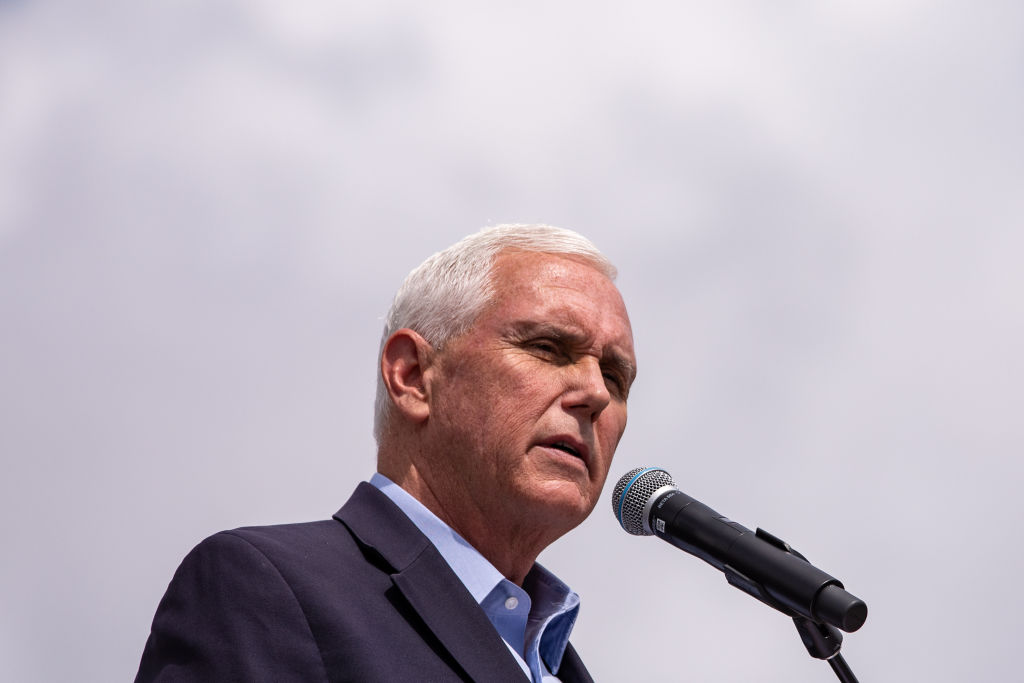Happy Friday! Are you one of the millions of Americans who suffer from sleep apnea? You’re in company with President Joe Biden, whose CPAP machine left indentations on his face earlier this week and revealed his use of the device to the world.
Up to Speed
- The Supreme Court ruled on Thursday that colleges and universities cannot use affirmative action based on race to grant admissions. “Eliminating racial discrimination means eliminating all of it,” wrote Chief Justice John Roberts for the 6-3 conservative majority. “In other words, the student must be treated based on his or her experiences as an individual—not on the basis of race.” President Joe Biden rebuked the decision, saying the country could not allow the court’s ruling to be “the last word” on the issue.
- Florida Gov. Ron DeSantis’ administration allocated $92 million in federal COVID-19 stimulus funds to a highway interchange project that benefits a top political donor, Mori Hosseini. The project expedites, by more than a decade, Hosseini’s plans to develop the nearby land into a residential and shopping district. According to the Washington Post, Hosseini has had a close relationship with DeSantis, including gifting a golf simulator to the governor’s mansion, repeatedly allowing DeSantis to use his private plane, and indirectly donating hundreds of thousands of dollars to boost DeSantis’ 2022 reelection campaign.
- Robert F. Kennedy Jr. is surging in the polls—but only among Republicans. Kennedy’s electoral support among Democrats has hovered between 8 and 12 percentage points, while his net favorability in the party has fallen considerably, per the Washington Post.
- House Republicans are pushing for impeachment proceedings against President Biden and members of his administration, including Homeland Security Secretary Alejandro Mayorkas, FBI Director Christopher Wray, and Attorney General Merrick Garland. All three are slated to provide testimony in the coming months, according to CNN. The House has several ongoing probes into Biden’s conduct, but some GOP members want a prompt vote to impeach the president. Others are less eager, with Republican Rep. Jeff Van Drew stating, “Before you impeach a president, there is a process of fact-gathering.”
In Kyiv, Pence Calls for ‘Strong American Support’ of Ukraine
Former Vice President Mike Pence made a surprise visit to Ukraine Thursday, meeting with the country’s president, Volodymyr Zelensky, and receiving briefings from Ukrainian officials on the state of the ongoing war with Russia.
Pence is the first Republican presidential candidate this cycle to make a trip to Ukraine, and it comes more than a year after he traveled to the Ukraine-Poland border to meet refugees from the Russian invasion. At a time when the GOP field appears split on whether America should continue to provide military aid to the Ukrainians, Pence’s appearance allowed him to articulate a vision of support for Ukraine’s fight against Russian aggression.
“I believe America’s the leader of the free world,” Pence told NBC News, which first reported on his trip. “But coming here just as a private citizen—being able to really see firsthand the heroism of the Ukrainian soldiers holding the line in those woods, see the heroism of the people here in Irpin that held back the Russian army, to see families whose homes were literally shelled in the midst of an unconscionable and unprovoked Russian invasion—just steels my resolve to do my part.”
Like his first visit last year, this Ukraine trip was facilitated by Samaritan’s Purse, the evangelical Christian charity, according to a Pence aide. Pence also visited a bridge destroyed during Russia’s 2022 offensive toward Kyiv, laid flowers at the Wall of Remembrance for fallen Ukrainian soldiers, and visited a mass burial site for civilians. And the Pence team appears to be doing a full-court press with the media to publicize the trip, including an interview Thursday night with CNN’s Erin Burnett in Kyiv and planned interviews this weekend with the Sunday talk shows on ABC and CBS.
Pence, gearing up for a stretch of campaigning in Iowa next week, holds a position on Ukraine that appears to be losing support among the GOP faithful. Recent polling from Pew shows that Republicans and Republican-leaning respondents increasingly say the United States is spending too much on military aid for Ukraine—with 44 percent saying so in Pew’s June poll, up from just 9 percent of Republicans who said the same in March 2022, shortly after the war began.
Still, Pence is hardly alone among GOP leaders in expressing support for Ukrainian aid. That group includes Senate Minority Leader Mitch McConnell and House Speaker Kevin McCarthy, though McCarthy has said a Senate proposal to increase the amount of aid is going nowhere in the House. It further includes Republican presidential candidates such as Chris Christie, Tim Scott and Nikki Haley, who says helping Kyiv defeat Moscow is key to U.S. efforts to contain China.
But the views of the two leading GOP candidates, Donald Trump and Ron DeSantis, are less clear.
Trump has dodged the question of whether he would continue to support military aid and instead claims he could end the war “in 24 hours,” although the former president doesn’t say how. And DeSantis? Before entering the race, the Florida governor answered a questionnaire from a now-former Fox News host in which he referred to the war as a “territorial dispute” and decried what he called the Biden administration’s “blank check” to Ukraine. DeSantis later walked back some of this by saying Vladimir Putin’s invasion was “wrong.”
Furthermore, Vivek Ramaswamy, who often gives voice to the Republican primary voter’s id, told ABC News earlier this month that the U.S. should broker a deal making Ukraine offer “major concessions” to Russia to end the war and to better “look after America’s interests.”
Needless to say, Pence’s view is more typical of the pre-Trump, Reagan-era Republican.
“We’ll let the polls and the politics take care of themselves, but for me it was important to be here to better understand what the people of Ukraine have endured, the mindless violence that was perpetrated on them in an unprovoked invasion by the Russian military and the progress that they’ve made in pushing back that military,” he told NBC. “It’s steeled my resolve, and it’s made me better equipped to be able to go home as I speak to the American people about the vital importance of American support to repel Russian aggression.”
The former vice president’s trip comes as the Ukrainian counteroffensive continues to push back at the Russian incursions in the eastern part of the country. While Ukraine continues to claim its forces are advancing on Russian-held areas, it continues to suffer from Russian missile strikes.
NRSC Chairman Puts Early Endorsement Strategy to Work in Montana
In the wake of Senate Republicans’ frustrating midterm performance last fall, the chairman of the National Republican Senatorial Committee, Sen. Steve Daines, is wasting no time this cycle rallying other Republicans behind his preferred 2024 candidates.
That strategy appears to be working in Daines’ home state of Montana, a must-win battleground for Republicans where decorated military veteran and wealthy businessman Tim Sheehy on Tuesday formally announced his campaign to challenge Democratic Sen. Jon Tester. The Republican cavalry are already heeding Daines’ call: As of Friday, Sheehy’s list of high-profile Republican endorsers includes Montana Gov. Greg Gianforte and five sitting U.S. Senators, Daines among them.
That list could soon include GOP Rep. Ryan Zinke of Montana, who according to one Republican strategist was instrumental in recruiting Sheehy to hop into the GOP primary.
“He’s certainly capable—he can write a check. I’m very fond of Tim Sheehy,” Zinke told The Dispatch last month.
Daines’ early endorsement game is sharply different from the hands-off primary approach championed by his predecessor at the Senate GOP campaign arm, Sen. Rick Scott of Florida. During the 2022 cycle, Scott’s NRSC did not get involved in GOP primaries, and many Republicans have since blamed him for hurting the party’s chances of flipping Democrat-held seats in Pennsylvania, Arizona, and Georgia. Senate Republicans are hoping to avoid messy and costly primaries next cycle in their bid to win the majority.
With that in mind, Daines is counting on Sheehy’s early spate of endorsements scaring off likely primary challenger Matt Rosendale, the two-term congressman, former state auditor, and 2018 Senate nominee who lost to Tester by more than three points—and who is strongly considering running again in 2024.
“Congratulations to Mitch McConnell and the party bosses on getting their chosen candidate,” Rosendale said on Twitter Tuesday. “Now Washington has two candidates – Tim Sheehy and Jon Tester – who will protect the DC cartel…Unfortunately for them, Montanans don’t take orders from Washington.”
Sheehy, the CEO of aerial firefighting company Bridger Aerospace, is expected to pour millions of his personal wealth into his campaign. Republican strategists working for him in the primary say they plan to hit Tester on his liberal voting record and his campaign finance ties to defense lobbyists while serving as chairman of the Senate Defense Appropriations Subcommittee.
Should Rosendale run, he’d likely get a boost from the Club for Growth, an anti-tax advocacy group that backed his 2018 bid but remains neutral in the primary as of this week.
“Daines really doesn’t want him to run,” Club for Growth President David McIntosh said of Rosendale back in May. “I think Matt’s testing the waters to see if he can do the fundraising. We supported him last time and he’d make a great Senator.”
Rosendale had just $1.2 million on hand as of April 1, according to Federal Election Commission filings. The FEC’s second quarter filing deadline is July 15.
Notable and Quotable
“I think that repelling Russian aggression is not just in the interest of people here in Kyiv and in Ukraine, I think it’s in our national interest.”
—Former Vice President Mike Pence to CNN’s Erin Burnett, Thursday, June 29












Please note that we at The Dispatch hold ourselves, our work, and our commenters to a higher standard than other places on the internet. We welcome comments that foster genuine debate or discussion—including comments critical of us or our work—but responses that include ad hominem attacks on fellow Dispatch members or are intended to stoke fear and anger may be moderated.
You are currently using a limited time guest pass and do not have access to commenting. Consider subscribing to join the conversation.
With your membership, you only have the ability to comment on The Morning Dispatch articles. Consider upgrading to join the conversation everywhere.